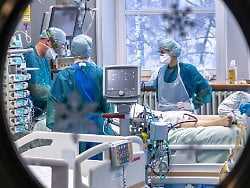Saturday, January 08, 2022
“Medically questionable”
Experts consider corona resolutions to be risky
With a new, complicated set of rules, the quarantine times are to be shortened while still ensuring adequate protection against infection. Experts doubt that it will work. There is also praise for the federal-state resolutions – with reservations.
The resolutions of the federal and state governments to contain the corona pandemic have met with a mixed response. The exemption from quarantine for freshly vaccinated or recovered contact persons is “medically questionable,” said the chairwoman of the Marburger Bund, Susanne Johna, in an interview with the “Neue Osnabrücker Zeitung”. A person who has recovered from the delta variant is not immune to the omicron variant. “That is why a quarantine must also apply to those who have recently been vaccinated and those who have recovered if there is close contact in the home environment,” demanded Johna.
There should be simpler isolation and quarantine rules for corona infected people and contact persons in the future. Accordingly, contact persons will be exempted from quarantine in the future if they have a booster vaccination, i.e. are boosted. The new exemption from quarantine also applies to those who have been newly vaccinated twice or who have recently recovered – in other words, to contact persons whose illness or vaccination was less than three months ago.
On the other hand, praise came from the municipalities. The shortening of the quarantine and isolation times makes sense, said district council president Reinhard Sager of the “Neue Osnabrücker Zeitung”. This creates a good balance between containing the virus and securing important infrastructure areas. The German Association of Towns and Municipalities also assessed the resolutions as positive in principle, but lacked prospects. “Unfortunately, the federal and state governments have not used the opportunity to show people clear future prospects, albeit with reservations,” said chief executive Gerd Landsberg of the “Rheinische Post”.
“Risk of maintaining transmission chains”
The waiver of a quarantine for contacts with booster vaccinations is not without controversy. Epidemiologist Hajo Zeeb had said in the run-up to the federal-state resolutions that freshly boosted people did have a certain protection against the omicron infection, which is in any case better than those who have been vaccinated twice. The expert from the Leibniz Institute for Prevention Research and Epidemiology in Bremen, however, pointed out: “Completely foregoing quarantine for close contacts that have already been boosted certainly carries a certain risk of maintaining chains of transmission.” It is well known that the risk of severe courses in boosted and also double vaccinated people is low. Nevertheless, in his view, five days of minimum quarantine are also safer for those who have been boosted.
The patient protection advocate Eugen Brysch sees a risky regulatory loophole in the quarantine decisions. It is correct that infected employees in care facilities and hospitals should only be released from isolation prematurely with a negative PCR test. “However, it is irresponsible that the 360,000 employees of the outpatient care services were left out of this regulation,” said the board of the German Foundation for Patient Protection to the newspapers of the Funke media group. “This puts a million people in need of care at great risk at home.”
It is currently still unclear when the new rules on quarantine and isolation will apply. The federal and state governments would make the necessary changes to the legal regulations “promptly”, according to the resolution. “From my point of view, it would be necessary to hold special sessions of the Federal Council and the Bundestag as soon as possible,” said the Finance Minister of Schleswig-Holstein, Monika Heinold. The Federal Council meets on Friday next week.
Protests expected in many places
When it comes to the stricter rules for gastronomy, not all federal states are taking the same path. At the conference, a 2G-plus regulation for restaurants, cafés and pubs was resolved. This means that only those who have been boosted or have been vaccinated twice with a daily test should have access. This already applies in a number of federal states. Saxony-Anhalt has already announced that it will not implement this regulation, and Bavaria still wants to examine the plans.
Criticism came from some of the industry: “With 2G Plus, politicians see us as part of the solution to accelerate the booster campaign. At the same time, we are referred to as a problem area, which is unacceptable,” said the managing director of the German Hotel and Restaurant Association (Dehoga ), Ingrid Hartges, the “picture”. You expect more appreciation and respect for the industry.
The food, enjoyment, and restaurants union (NGG) welcomed the stricter Corona rules for the catering trade, but demanded a minimum short-time work allowance of 1200 euros per month for employees. Protests against the corona measures are planned again for the weekend in various cities in Germany. In Düsseldorf, opponents of the mandatory vaccination announced a train with several thousand people through the city. 11,000 demonstrators are expected in Hamburg, and large protests are also expected to take place in Frankfurt and Freiburg.
